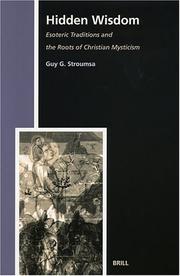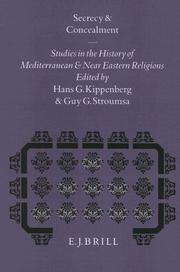| Listing 1 - 4 of 4 |
Sort by
|

ISSN: 15709434 ISBN: 9004136355 9786610859405 1429426896 9047404777 1280859407 1433704420 9789004136359 9781429426893 Year: 2005 Volume: 70 Publisher: Leiden: Brill,
Abstract | Keywords | Export | Availability | Bookmark
 Loading...
Loading...Choose an application
- Reference Manager
- EndNote
- RefWorks (Direct export to RefWorks)
This book investigates the problem of esoteric traditions in early Christianity, their origin and their transformation in Patristic hermeneutics, in the West as well as in the East. It argues that these traditions eventually formed the basis of nascent Christian mysticism in Late Antiquity. These esoteric traditions do not reflect the influence of Greek Mystery religions, as has often been claimed, but rather seem to stem from the Jewish background of Christianity. They were adopted by various Gnostic teachings, a fact which helps explaining their eventual disappearance from Patristic literature. The eleven chapters study each a different aspect of the problem, including the questions of Gnostic and Manichaean esotericism. This book will be of interest to all students of religious history in Late Antiquity. Revised and extended paperback edition. Originally published in 1996. Please click here for details.
Occultism --- Discipline of the secret. --- Mysticism --- Religious aspects --- Christianity --- History of doctrines --- History --- Discipline of the secret --- Arcane chrétien --- Mysticisme --- Occultisme --- Histoire --- Aspect religieux --- Christianisme --- Primitive and early church, ca. 30-600 A.D. --- History. --- Church history --- Disciplina arcani --- Secret, Discipline of the --- Church discipline --- Secrecy --- Theology, Doctrinal --- Art, Black (Magic) --- Arts, Black (Magic) --- Black art (Magic) --- Black arts (Magic) --- Occult, The --- Occult sciences --- Supernatural --- New Age movement --- Parapsychology --- esoteric traditions --- Christian mysticism --- early Christianity --- patristic hermeneutics --- Late Antiquity --- Greek mystery religions --- Judaism --- gnosticism --- Manichean esotericism --- religious history

ISSN: 01698834 ISBN: 9004102353 9789004102354 9004378871 9789004378872 Year: 1995 Volume: 65 Publisher: Leiden: Brill,
Abstract | Keywords | Export | Availability | Bookmark
 Loading...
Loading...Choose an application
- Reference Manager
- EndNote
- RefWorks (Direct export to RefWorks)
This volume deals with secrecy and concealment in the history of mediterranean religions as pattern of social interaction. Secrecy is a powerful means in establishing identity and interaction as G. Simmel has demonstrated. Using his approach the scholars of this volume describe and explain the practical meaning of concealment in two different religious systems: in Egyptian and Greek polytheism and in Jewish, Christian, Gnostic and Shi'i monotheisms. This point of view reveals that all these religions shaped social norms concerning public and private aspects of the human self.
Secrecy --- Secret --- Religious aspects --- Congresses --- Aspect religieux --- Congrès --- Mediterranean Region --- Middle East --- Méditerranée, Région de la --- Moyen-Orient --- Religion --- Congresses. --- 291.1 --- -Concealment --- Privacy --- Hiding places --- Godsdienstfilosofie --- -Congresses --- Asia, South West --- Asia, Southwest --- Asia, Western --- East (Middle East) --- Eastern Mediterranean --- Fertile Crescent --- Levant --- Mediterranean Region, Eastern --- Mideast --- Near East --- Northern Tier (Middle East) --- South West Asia --- Southwest Asia --- Orient --- Circum-Mediterranean countries --- Mediterranean Area --- Mediterranean countries --- Mediterranean Sea Region --- -Congresses. --- -Godsdienstfilosofie --- 291.1 Godsdienstfilosofie --- -291.1 Godsdienstfilosofie --- Concealment --- Congrès --- Méditerranée, Région de la --- Religious aspects&delete& --- Asia, West --- West Asia --- Western Asia --- Secrecy - Religious aspects - Congresses.
Book
ISBN: 0674974867 0674974883 9780674974883 9780674545137 0674545133 Year: 2016 Publisher: Cambridge, Mass. ; London Harvard University
Abstract | Keywords | Export | Availability | Bookmark
 Loading...
Loading...Choose an application
- Reference Manager
- EndNote
- RefWorks (Direct export to RefWorks)
Late antiquity saw a revolution in literate culture the consequences of which, for more than a millennium, were no less dramatic than those of the invention of the movable type in early modernity. Both the transformation of the physical support of the books (from scroll to codex) and also, more importantly, the redaction of foundational texts of new religions, permitted the birth and growth of new, world religions, such as Christianity, Manichaeism, and then Islam. Within and without the borders of the Roman Empire, it was often in translation that those texts circulated, and that commentaries were elaborated, usually in writing but also orally. But the status of books underwent in the Roman world even more radical changes, which have to do with their central role in religion and religious education. Books, including sacred books, had of course existed in archaic and ancient societies, but they were now invested with a new status as they were taking the place previously held by sacrifice at the very core of ritual.--
Sacred books --- Church history --- Christianity and other religions. --- Books --- Christianity --- Christianity and other religions --- Syncretism (Christianity) --- Religions --- Apostolic Church --- Church, Apostolic --- Early Christianity --- Early church --- Primitive and early church --- Primitive Christianity --- Fathers of the church --- Great Apostasy (Mormon doctrine) --- History and criticism. --- Religious aspects --- Christianity. --- Relations --- History --- 27 "00/06" --- Library materials --- Publications --- Bibliography --- Cataloging --- International Standard Book Numbers --- 27 "00/06" Histoire de l'Eglise--?"00/06" --- 27 "00/06" Kerkgeschiedenis--?"00/06" --- Histoire de l'Eglise--?"00/06" --- Kerkgeschiedenis--?"00/06" --- History and criticism --- Religious aspects&delete& --- 11.51 early Christianity. --- Vie chrétienne
Book
ISBN: 9780521117869 0521117860 9780511760648 9781107693128 9780511932359 0511932359 0511760647 1107693128 0511852193 1107203333 0511924631 1282918605 9786612918605 0511931018 0511927177 0511929676 Year: 2010 Publisher: Cambridge: Cambridge university press,
Abstract | Keywords | Export | Availability | Bookmark
 Loading...
Loading...Choose an application
- Reference Manager
- EndNote
- RefWorks (Direct export to RefWorks)
"The social and intellectual vitality of Judaism and Christianity in antiquity was in large part a function of their ability to articulate a viably transcendent hope for the human condition. Narratives of Paradise - based on the concrete symbol of the Garden of Delights - came to play a central role for Jews, Christians, and eventually Muslims too. These collected essays highlight the multiple hermeneutical perspectives on biblical Paradise from Second Temple Judaism and Christian origins to the systematic expositions of Augustine and rabbinic literature. They show that while early Christian and Jewish sources draw on texts from the same Bible, their perceptions of Paradise often reflect the highly different structures of the two sister religions. Dealing with a wide variety of texts, these essays explore major themes such as the allegorical and literal interpretations of Paradise, the tension between heaven and earth, and Paradise's physical location in space and time"-- Provided by publisher.
Paradise. --- Future life. --- Paradise --- Future life --- -Paradise --- -Future life --- -236.6 --- 296*61 --- 296*82 --- Afterlife --- Eternal life --- Life, Future --- Life after death --- Eschatology --- Eternity --- Immortality --- Near-death experiences --- Hemel. Paradijs. Uitverkorenen. Triomferende Kerk --- Joodse theologie en filosofie--in de oudheid --- Dialoog joden - christenen --- 296*82 Dialoog joden - christenen --- 296*61 Joodse theologie en filosofie--in de oudheid --- 236.6 Hemel. Paradijs. Uitverkorenen. Triomferende Kerk --- #GGSB: Dogmatiek --- #GGSB: Schepping --- 236.6 --- Christianity --- Judaism --- Religious aspects --- Religious studies --- Judaism. --- Christianity. --- Paradise (Judaism) --- Dogmatiek --- Schepping --- Arts and Humanities --- Religion --- Paradise - Judaism. --- Paradise - Christianity. --- Future life - Judaism. --- Future life - Christianity.
| Listing 1 - 4 of 4 |
Sort by
|

 Search
Search Feedback
Feedback About UniCat
About UniCat  Help
Help News
News